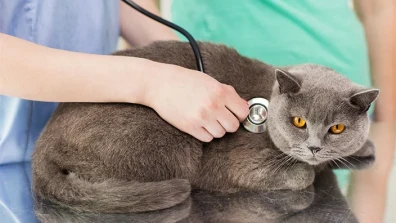During challenging and tough situations, it is the habit of living organisms to scratch their heads. The same is an issue with dogs, cats, rabbits, and other small animals. Most dogs scratch their heads in tense situations but they cannot help their selves.
Ear problems and ear health are serious to address, all you have to do is to figure out the problem timely and then act accordingly. Notice the excessive head shaking of your dog itching ears and how head tilted dog feels.
Read this piece of informative and phenomenal writing. The article is about the signs and symptoms, causes, treatment, and prevention of dog itchy ears.
Table of Contents
- Powerful Ears Of Dogs
- Dr. Smith About Dog Ear Itching
- Figure Out What’s Scratching Your Dog
- Signs And Symptoms
- Causes Of Dog Itchy Ears
- Treatment of Dog Itchy Ear
- Use Sterilized Equipment to Clean Dog
- Prevent the Causes of Infections
- Can Humans Catch Ear Mites from Pets?
- Are Some Pets Prone To Ear Issues?
- Conclusion
- Frequently Asked Questions
Powerful Ears Of Dogs
Dogs have powerful ears and can detect sound frequency three times higher than human ears. Dogs are used by the army and intelligence agencies for many other purposes on account of their fast-smelling and hearing sense.
Hunters use dogs to detect the sounds of other animals and birds. Watchdogs are famous for watching and gatekeeping in houses.
Related Blog:How to Comfort a Dog with Pancreatitis
Dr. Smith About Dog Ear Itching
Veterinarians have come up with different reasons of why the dogs become accustomed to frequent ear itching; however the renowned Dr. Smith observed as follows: -

Figure Out What’s Scratching Your Dog
Dogs do scratch their heads but they cannot help their selves with a head shake. Scratching their ears are serious problem to address, all you have to do is figure out the problem timely and then act accordingly.
First of all, examine signs and symptoms and then find out the appropriate treatment.
Signs And Symptoms
What are the signs and symptoms of Dog itchy ears? The prominent signs and common symptoms of dog itchy ears are; hearing loss, swelling, redness, funky or fruity odors, ear discharge (usually yellow or brown), new bumps or spots, bleeding or dried blood, sudden loss of balance or sense of direction.
There you may also observe some visible scabs with hair loss. The major sign is that they will scratch their heads with their paws all the time. There will be odor and swelling with ear flap which may result in yellow or brown discharge from the dog’s itchy ears.
Causes Of Dog Itchy Ears
After knowing the causes, you will be able to treat your dog well. The following may be the possible causes for itching dog’s ears: -
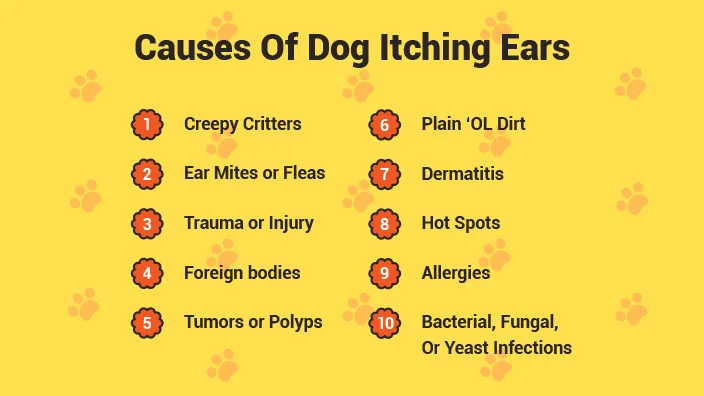
Creepy Critters
Dog’s itchy ears may be caused due to the creepy critters. Your dog may play or live in muddy hikes or it may take interest in roughhousing in the dog park.
Whatever the case, such muddy hikes and roughhousing at the dog park are the habitat of millions of microorganisms and they are constantly in search of such a host to attack on.
Ear Mites Or Fleas
Ear mites or fleas may cause itching ears, these may be the prominent causes of this issue. What are mites? Mites are kind of parasites responsible for itching, irritation, redness, odor, prolonged scratching, or some discharge.
Fleas are also responsible for itchy dog ears, so you should first determine the cause and then go for routine veterinary care on how to treat and get rid of mites and fleas.
Trauma Or Injury
Trauma or injury is crucial as well for a dog’s itchy ears. Any small cut that seems like as injury can be a trauma for a dog, big trauma for a dog may be a ruptured eardrum.
Whenever you notice your dog's injury, you are directed to call a veteran for a proper diagnosis of your dog and treat it timely. If not treated on time it may result in itching the dog’s ear.
Foreign Bodies
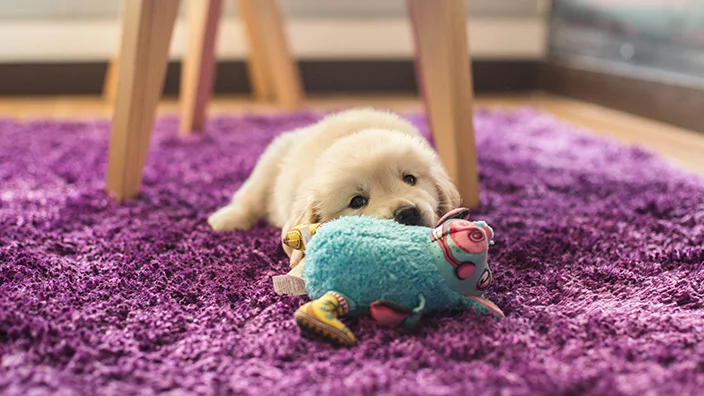 Foreign bodies may be as small or as big as toys, whenever a dog’s ear picks up a toy may result in the dog itching eras. You cannot detect either the cause is foreign objects or something else, only vet’s tools can perform that function for you.
Foreign bodies may be as small or as big as toys, whenever a dog’s ear picks up a toy may result in the dog itching eras. You cannot detect either the cause is foreign objects or something else, only vet’s tools can perform that function for you.
Tumors Or Polyps
How can tumors or polyps be the cause of itching dog ears? You may have seen ear bumps, ear wax, pus discharge, or any other thing, they are not always ear polyps or cancer.
Sometimes the ear wax makes up polyps and leads to dog ears itching. Other than that a tumor in your dog's ears can also result in inner ear problems.
Plain ‘OL Dirt
Itching dog’s ears can be a result of simple dust or dirt, after playing all day outside in the dirt they get itching and scratch their heads or ears. Whether you want to visit a Vet or at home you do dog’s ears clean with sterilized equipment.
Dermatitis, Hot Spots, Or Allergies
Dermatitis is a medical condition in which dogs get some severe issues like itching ears, the causes may be of a wide range.
Hot spot is also a condition in which dogs get itchiness and scratch their body to get relief. You can also blame serious allergies for dog ears itching because they may also be the culprits.
“Pet’s ear with sensitivity to pork, beef, chicken, or any other type of documented allergen typically will have notable to intense pruritus (itchiness) of both of their ears during a flare-up,” -Dr. Smith.
Infection
The itching ears of dogs may be caused due to countless chronic ear infections like bacterial, fungal, or yeast infections. Ear mites, fleas, and food allergies also lead to itching ears.
The major cause can be an ear infection, it is vital to see whether the environment is contaminated or not. The dog ear infections include the following causes: -
Bacterial, Fungal, Or Yeast Infections
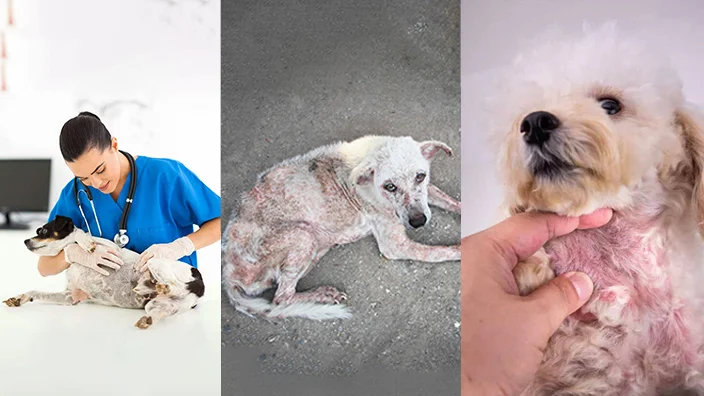 Bacterial infections, fungal infections or yeast infections are the kinds of infections that cause itchy dog ears. The most dangerous among the causes are ear infections, if not treated on time they may cause loss of hearing.
Bacterial infections, fungal infections or yeast infections are the kinds of infections that cause itchy dog ears. The most dangerous among the causes are ear infections, if not treated on time they may cause loss of hearing.
According to Dr. Smith, the more prone dogs are breads like Beagles and Dachshunds, that have floppy ears. Only Vets can determine the cause and prescribe the concerned treatment. They will also recommend the best things, times, and ways to clean the ears of dogs.
Treatment of Dog Itchy Ear
In addition to the signs and symptoms and causes of itching ears, it would be preferable to discuss the possible and effective treatments. What are the most effective treatments for itching ears by dogs?
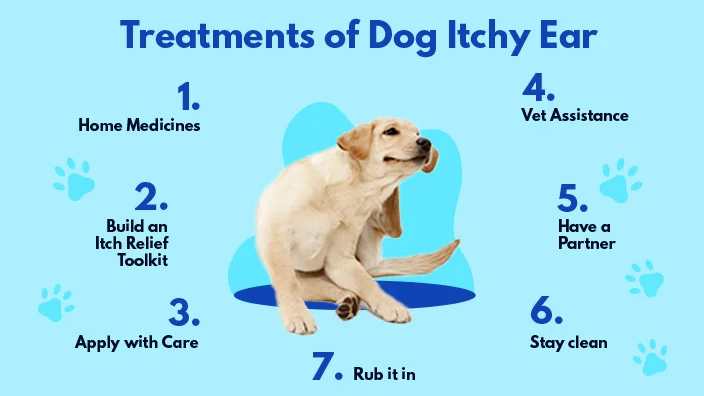
Home Medicines
In the case of dirt and dust, you can use your home remedies and medicines like Calendula Lotion, Apple Cider Vinegar (Diluted), Hydrocortisone Ointment, Mullein Oil, and Antihistamines.
If you have these medicines at home, then you are directed to the healing or itching relief aid over the counter.
BUILD an Itch Relief Toolkit
After getting the prescription of Vet it will take some time to heal the infection, and till then you will have to take care of your dog. It is a good idea to build an itching relief toolkit for itching dog ears.
To do so you will be able to remove the dust, allergens, and other foreign bodies that tease you sweet dog. Ask the Vet to get Apoquel for treating allergies, it is a good anti-allergic medicine.
Apply With Care
Whatever you do, do it with care. If you are using any cream, skin oils, or ointment, use it in moderate amounts, using it in excessive amounts may damage your dog's ears.
Medicines are easy to administer but applying liquid to the ear is a little bit risky, you will avoid applying too much to not harm the dog’s ear canal.
Vet Assistance
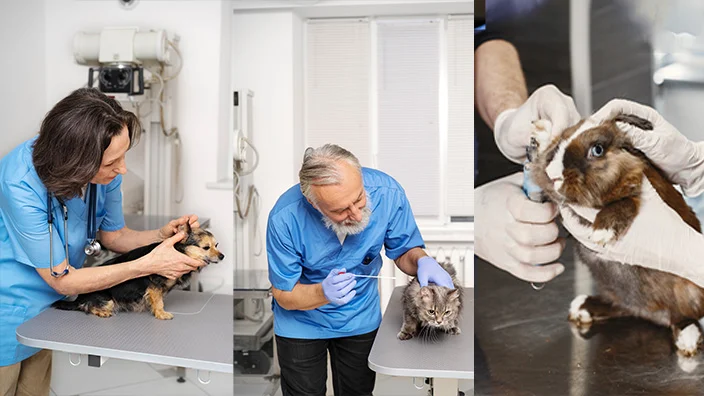 The best advice is to visit a Vet and ask him about every possible ear care that can be taken. Vets have the knowledge of every sign and symptom and the cure for every cause. So without Vet assistance, it would be a foolish act to start treatment.
The best advice is to visit a Vet and ask him about every possible ear care that can be taken. Vets have the knowledge of every sign and symptom and the cure for every cause. So without Vet assistance, it would be a foolish act to start treatment.
Have a Partner
Taking a partner with you to clean and treat your itching ears dog would be a great idea. What your partner does will hold your injured fellow still and you will easily apply the cream or ointment without putting it to the ear canal and harming the eardrum.
Stay Clean
Whatever you use for treatment, use sterilized equipment, for the ointment which has a narrow tip for applying, do not touch the tube tip with the dog. By doing so, you will increase the chances of spreading germs with that tube.
Rub It In
To rapid up the treatment process of itching ears, whenever you apply something to the infected area, wait for a while and then rub it in or massage it properly.
Use Sterilized Equipment to Clean Dog
All you have to do is keep the infected area clean and do not touch the narrow tip of the cream or ointment tube.
To get rid of germs, fungi, bacteria, yeast, mites, and other foreign bodies that aid infection, you will have to use the following sterilized equipment.

Scissor
Clean and sterilized scissor is needed to cut the hair from the infected area. A pair of rounded-edged scissors can cut the hair and you will then easily apply the cream to the infected area.
Cotton Materials
In addition to a pair of round-edged scissors, you will need cotton swabs soaked in Dettol to clean up the pus and other infections of dog ears. You can also use wipes, pads, tissues, etc. but remember cotton balls should not get stuck inside.
Ear Cleaning Solution
Warm water and ear cleaner with ear drops are good but better than the ear cleaning solution. The infection of dog itching ears can only be wiped away by a particular solution. One of the best products is Vetericyn’s antimicrobial ear rinse for itching ears.
Prevent the Causes of Infections
If you have already experienced itching dog ears or the one who do not want such a situation to happen ever, try to provide a good environment and a healthy diet.

Supplements like fish oil, Vitamin E, Turmeric, and Probiotics will be helpful as well.
Can Humans Catch Ear Mites from Pets?
The mites that cause itching of dog’s ears cannot infect human ears. The mites that harm dogs are different than that of harming humans.
There were only rare cases recorded in pet owners who got skin problems but there is nothing to worry about. Clean up your dog and apply the cream while wearing a facemask and hand gloves.
Are Some Pets Prone To Ear Issues?
According to Dr. Smith, the more prone dogs are breads like furry friends, Beagles, and Dachshunds that have floppy ears. Frequent swimming or bathing can also increase the chances of getting fungi, yeast, and bacteria.
Conclusion
Dog itching ears is a serious problem in many dogs can caused by mites, yeast, fungi, bacteria, dust, and other foreign objects.
The signs and symptoms may include hearing loss, swelling, redness, funky or fruity odors, discharge (usually yellow or brown), new bumps or spots, bleeding or dried blood, and sudden loss of balance or sense of direction.
You can treat your dog itching ears by visiting a professional Vet or can get some medicines over the counter. Do take proper care while applying anything to the infected ears, wear gloves and facemask, and keep your dog's itching ears clean.
Frequently Asked Questions
What can I do for my dogs itchy ears?
Visit a professional Vet or can get some medicines over the counter. While applying anything to the infected ears, wear gloves and a facemask and keep your dog's itching ears clean.
How can you tell if your dog has ear mites?
Mites are a kind of parasite responsible for itching, irritation, redness, odor, dog’s ear scratching, or some discharge. you should first determine the cause then should ask the veteran.
Why does my dog's ear itch and shake his head?
Hearing loss, swelling, redness, odors, discharge, bleeding or dried blood, sudden loss of balance, and scabs with hair loss are the signs for which your dog shakes his head.
What can I put in my dog's ears to soothe them?
You can use your home remedies and medicines like Calendula Lotion, Apoquel, Apple Cider Vinegar (Diluted), Hydrocortisone Ointment, Mullein Oil, and Antihistamines.











